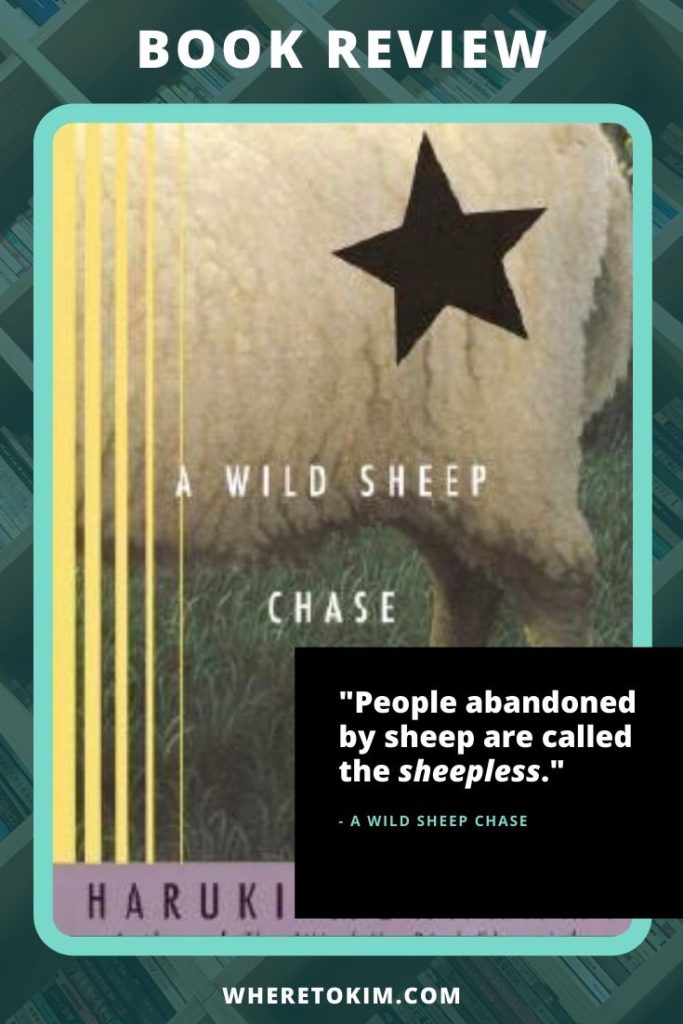A Wild Sheep Chase by Haruki Marukami is a really good book with an interesting story. There, I’ve said it, am I now allowed to join the sheeplessnessclub?
Location: This book is set in Japan and more specifically in Tokyo, Sapporo and the fictional Junitaki township north of Asahikawa in Hokkaido.
A Wild Sheep Chase Synopsis
His life was like a recurring nightmare: a train to nowhere. But an ordinary life has a way of taking an extraordinary turn. Add a girl whose ears are so exquisite that, when uncovered, they improve sex a thousand-fold, a runaway friend, a right-wing politico, an ovine-obsessed professor and a manic-depressive in a sheep outfit, implicate them in a hunt for a sheep, that may or may not be running the world, and the upshot is another singular masterpiece from Japan’s finest novelist.
Book review
“The sheep goes away leaving only an idea. But without the sheep there is no expelling the idea. That is what it is to be ‘sheepless.'” So that’s what happens when you’re left with the shadow of a sheep, a sheep bigger than life itself. I guess that is why I sometimes lack inspiration or action, because of my sheeplessness.
But what is the purpose of the pure white sheep with a brownish star on its back that started this wild sheep chase? The sheep has a monumental plan to transform humanity and the human world and does so by entering a person’s body. An act that is often seen as a blessing of the gods. The sheep is the one with the big plans, bringing down institutions and creating chaos and order. If you doubt the power of sheep, then remember Genghis Khan, because one sheep can transform the world. So let’s stop viewing sheep merely as a source of wool and meat.
The first part of the book takes place in Tokyo. Then the journey starts as the main character is sent to Hokkaido to chase a certain sheep. A sheep that might not exist and yet is the invisible driver behind change. Everyone involved sees it as a wild sheep (or goose) chase, but what can you do when more powerful people (the institutions) want something from you? “You hold the ball, you had better run for the goal. Even if there turns out not to have been any goal.”
Apparently there were 5000 sheep in Hokkaido in 1978, which is quite impressive as I hardly saw more than a few cows and some wild horses at a horse reservation on my trip to Kyushu (another part of Japan, I know). But I was often wondering where the Japanese hide their livestock farms.
The main character and his girlfriend with the beautiful ears head to the Dolphin Hotel in Sapporo (Hokkaido) to start their chase. They’re not very inspired researchers, but find a clue eventually and take the train to Asahikawa. Via the Shiogari Pass, they reach the fictional Junitaki township. As the main character reads more about the history of this township, we learn more about the Ainu, the original inhabitants of Hokkaido, and how one Ainu helped settlers found Junitaki.
Then the hiking starts as they make their way towards the person in the cabin that supposedly holds all the answers. A beautiful mountain hike with autumn foliage. I would have liked to join them, despite the cold weather. Especially when the author wrote: “We were totally alone. As if we’d been dropped off at the edge of the world.” It feels like you’re exploring the Hokkaido of the 1980s together with them. Before all the blogs wrote about the destination and when there were still many places to discover. Where can you go these days that no one has gone before you?
The cabin provides the main character with his much-needed sabbatical. It functions like a quiet retreat which also proves dangerous as we get to the surreal part of the book. This left me with some sad thoughts about my reflection in the mirror: when my reflection copies what I’m doing, it shows her lack of free will. And because there is another world with another me on the other side of the mirror, this must be quite upsetting for the other me’s (or perhaps for myself).
I enjoyed this book because of the meaning of the sheep and the allegory with the real world, yet I didn’t find it as exciting as I hoped. This was mainly because it was hard to connect to the characters. While I found the driver and the representative of the Boss fun to read about, the main character and his girl were like blank pages to me. I liked the part where they were exploring Hokkaido, as this motivated me to go out and visit new places too.
My appreciation of the concept and execution wins over the lack of fleshed-out characters. It was a really good book with an interesting story.
Translated from Japanese by Alfred Birnbaum.
Questions for reflection
An interesting discussion between the main character and his driver about naming animals, objects and people left me thinking:
- Can a given name affect someone’s will and limit freedom?
- Do you treat someone differently because of their name?
- Does a name based on a function or purpose provide extra stimulation or increase the likelihood of success?
- If so, can I now call someone who is driven to take over the world a sheep? And those that failed the ‘sheepless’?
Interested?
You can buy your copy of A Wild Sheep Chase from Amazon.







